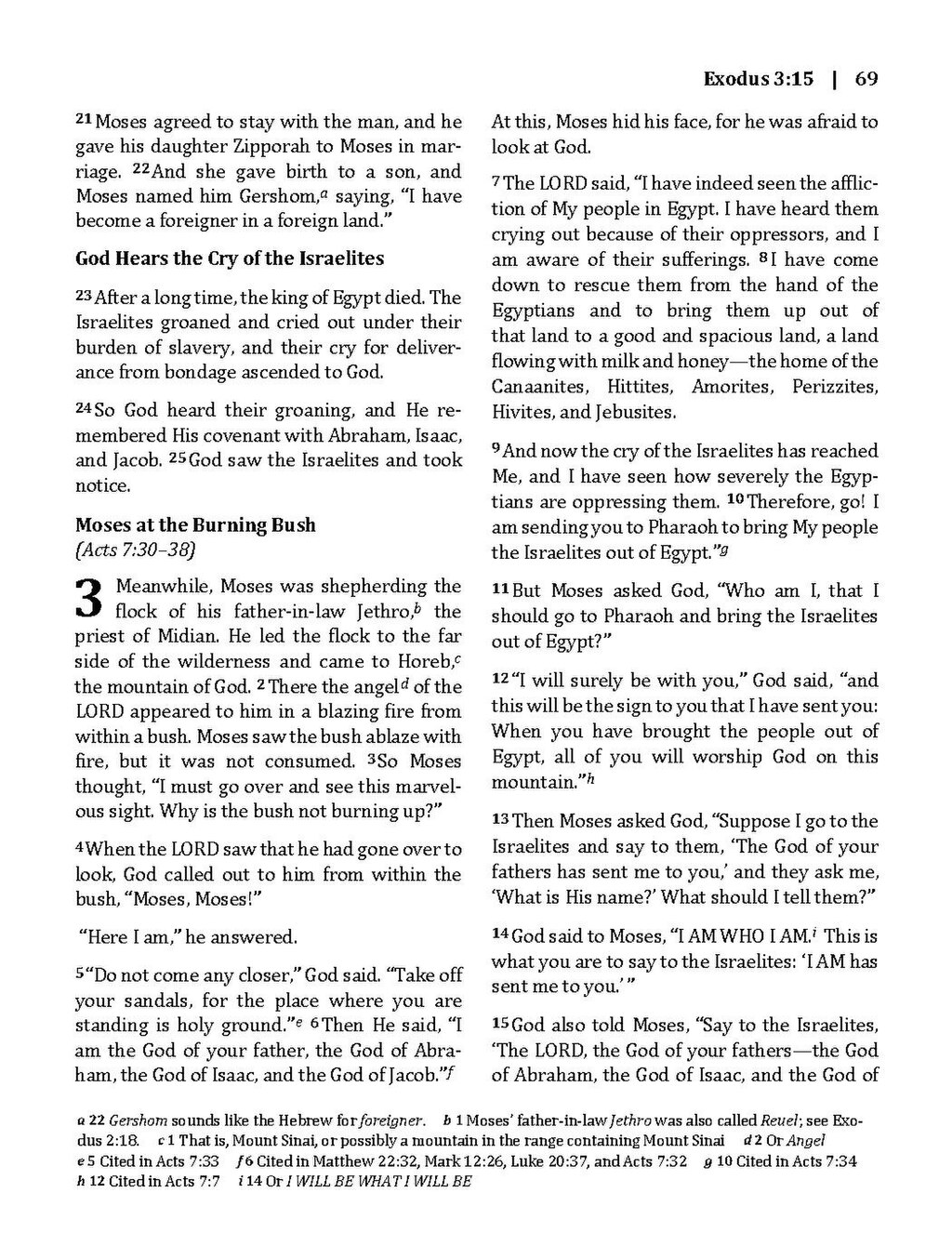21 Moses agreed to stay with the man, and he gave his daughter Zipporah to Moses in marriage. 22 And she gave birth to a son, and Moses named him Gershom,[1] saying, “I have become a foreigner in a foreign land.”
God Hears the Cry of the Israelites
23 After a long time, the king of Egypt died. The Israelites groaned and cried out under their burden of slavery, and their cry for deliverance from bondage ascended to God.
24 So God heard their groaning, and He remembered His covenant with Abraham, Isaac, and Jacob. 25 God saw the Israelites and took notice.
Moses at the Burning Bush
(Acts 7:30–38)
3 Meanwhile, Moses was shepherding the flock of his father-in-law Jethro,[2] the priest of Midian. He led the flock to the far side of the wilderness and came to Horeb,[3] the mountain of God. 2 There the angel [4] of the LORD appeared to him in a blazing fire from within a bush. Moses saw the bush ablaze with fire, but it was not consumed. 3 So Moses thought, “I must go over and see this marvelous sight. Why is the bush not burning up?”
4 When the LORD saw that he had gone over to look, God called out to him from within the bush, “Moses, Moses!”
“Here I am,” he answered.
5 “Do not come any closer,” God said. “Take off your sandals, for the place where you are standing is holy ground.”[5] 6 Then He said, “I am the God of your father, the God of Abraham, the God of Isaac, and the God of Jacob.”[6]
At this, Moses hid his face, for he was afraid to look at God.
7 The LORD said, “I have indeed seen the affliction of My people in Egypt. I have heard them crying out because of their oppressors, and I am aware of their sufferings. 8 I have come down to rescue them from the hand of the Egyptians and to bring them up out of that land to a good and spacious land, a land flowing with milk and honey—the home of the Canaanites, Hittites, Amorites, Perizzites, Hivites, and Jebusites.
9 And now the cry of the Israelites has reached Me, and I have seen how severely the Egyptians are oppressing them. 10 Therefore, go! I am sending you to Pharaoh to bring My people the Israelites out of Egypt.”[7]
11 But Moses asked God, “Who am I, that I should go to Pharaoh and bring the Israelites out of Egypt?”
12 “I will surely be with you,” God said, “and this will be the sign to you that I have sent you: When you have brought the people out of Egypt, all of you will worship God on this mountain.”[8]
13 Then Moses asked God, “Suppose I go to the Israelites and say to them, ‘The God of your fathers has sent me to you,’ and they ask me, ‘What is His name?’ What should I tell them?”
14 God said to Moses, “I AM WHO I AM.[9] This is what you are to say to the Israelites: ‘I AM has sent me to you.’”
15 God also told Moses, “Say to the Israelites, ‘The LORD, the God of your fathers—the God of Abraham, the God of Isaac, and the God of
- ↑ 22 Gershom sounds like the Hebrew for foreigner.
- ↑ 1 Moses’ father-in-law Jethro was also called Reuel; see Exodus 2:18.
- ↑ 1 That is, Mount Sinai, or possibly a mountain in the range containing Mount Sinai
- ↑ 2 Or Angel
- ↑ 5 Cited in Acts 7:33
- ↑ 6 Cited in Matthew 22:32, Mark 12:26, Luke 20:37, and Acts 7:32
- ↑ 10 Cited in Acts 7:34
- ↑ 12 Cited in Acts 7:7
- ↑ 14 Or I WILL BE WHAT I WILL BE
